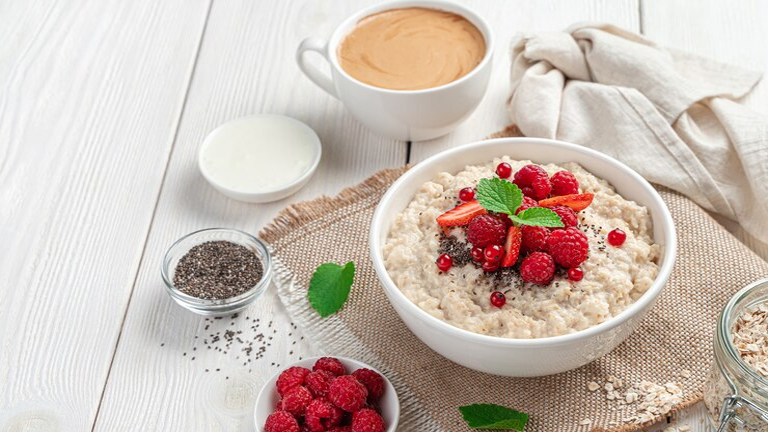Introduction
In the ever-evolving world of weight loss trends, a new buzzword has taken over social media: “Oatzempic.” A clever blend of “oatmeal” and “Ozempic,” this viral TikTok trend claims to offer rapid weight loss results—without the need for prescription medications. But does this oatmeal weight loss drink really work, or is it just another short-lived fad?
In this article, we’ll explore:
- What exactly Oatzempic is
- How it compares to Ozempic and other weight loss drugs
- Whether science supports its effectiveness
- Potential risks and healthier alternatives
What Is Oatzempic?
Oatzempic is a homemade drink made from blended oats, water, and sometimes lime juice or cinnamon. Inspired by the appetite-suppressing effects of semaglutide (Ozempic/Wegovy), proponents claim that drinking this mixture daily can lead to quick weight loss—some even reporting 10+ pounds in weeks.
Why Is It Trending?
- TikTok and social media hype – Thousands of users share their “Oatzempic before and after” results.
- Natural alternative to weight loss drugs – Many seek non-pharmaceutical ways to lose weight.
- Affordable and accessible – Unlike expensive medications, oats are cheap and easy to prepare.
Does Oatzempic Work for Weight Loss?
While the trend is viral, does it have any real scientific backing?
The Science Behind Oats and Weight Loss
Oats are rich in:
✅ Soluble fiber (beta-glucan) – Helps you feel full longer, reducing calorie intake.
✅ Low glycemic index – Stabilizes blood sugar, preventing cravings.
✅ Nutrient-dense – Provides vitamins and minerals without excess calories.
However, replacing meals entirely with an oatmeal drink can lead to:
❌ Nutrient deficiencies – Missing proteins, healthy fats, and other essential nutrients.
❌ Unsustainable weight loss – Rapid drops may result in muscle loss and rebound weight gain.
Oatzempic vs. Ozempic: Key Differences
| Feature | Oatzempic (Oatmeal Drink) | Ozempic (Semaglutide) |
| Mechanism | Fiber-induced fullness | GLP-1 hormone suppression |
| Cost | Cheap (~$5/week) | Expensive ($900+/month) |
| Side Effects | Bloating, nutrient gaps | Nausea, pancreatitis risk |
| Long-Term Use | Unproven | FDA-approved for obesity |
Verdict: While oats are healthy, Oatzempic is not a true Ozempic alternative—it’s more of a short-term appetite suppressant.

Potential Risks of the Oatzempic Diet
Before jumping on this trend, consider:
1. Extreme Calorie Restriction
Many versions of the diet suggest consuming only 300-500 calories per day, which can slow metabolism.
2. Lack of Essential Nutrients
Oats alone don’t provide enough protein, iron, or healthy fats, leading to fatigue and weakness.
3. Yo-Yo Dieting Effect
Quick weight loss often leads to rapid regain once normal eating resumes.
4. Digestive Issues
Too much fiber too quickly can cause bloating, gas, and constipation.
Healthier Alternatives to Oatzempic
If you want sustainable weight loss, try these science-backed methods instead:
1. Balanced Oatmeal Meals
- Add protein (Greek yogurt, nuts, or protein powder).
- Include healthy fats (chia seeds, almond butter).
- Mix in fruits (berries, bananas) for vitamins.
2. Portion Control & Mindful Eating
- Use smaller plates to avoid overeating.
- Eat slowly to recognize fullness cues.
3. Regular Exercise
- Strength training preserves muscle while burning fat.
- Cardio (walking, cycling) boosts calorie expenditure.
4. Consult a Doctor or Dietitian
For medically supervised weight loss, consider:
- Legitimate GLP-1 medications (if eligible).
- Personalized meal plans from a nutritionist.
Final Verdict: Is Oatzempic Worth Trying?
While Oatzempic may help with short-term appetite control, it’s not a magic solution for lasting weight loss. Extreme versions can be harmful, and a balanced diet with exercise remains the gold standard.
If you’re curious, try adding oats to a nutritious diet—not replacing meals entirely. And always consult a healthcare provider before making drastic changes.
Frequently Asked Questions (FAQs)
1. How much weight can you lose with Oatzempic?
Some report 5-10 lbs in 2 weeks, but much is likely water weight. Long-term results depend on overall diet and lifestyle.
2. Can Oatzempic replace Ozempic?
No—Ozempic is an FDA-approved medication for diabetes and obesity, while Oatzempic is just a high-fiber drink.
3. What’s the best Oatzempic recipe?
A balanced version includes:
- ½ cup oats
- 1 cup water or almond milk
- 1 tbsp chia seeds
- ½ banana or berries
- Dash of cinnamon
4. Are there side effects?
Excessive oat consumption can cause bloating, gas, and nutrient deficiencies if not balanced with other foods.
Conclusion
The Oatzempic trend highlights society’s constant search for quick weight loss fixes. While oats are a healthy, fiber-rich food, relying solely on an oatmeal weight loss drink is neither sustainable nor medically advised.
For long-term success, focus on whole foods, portion control, and regular exercise—not viral TikTok hacks.
Would you try Oatzempic, or do you prefer proven weight loss methods? Let us know in the comments!

